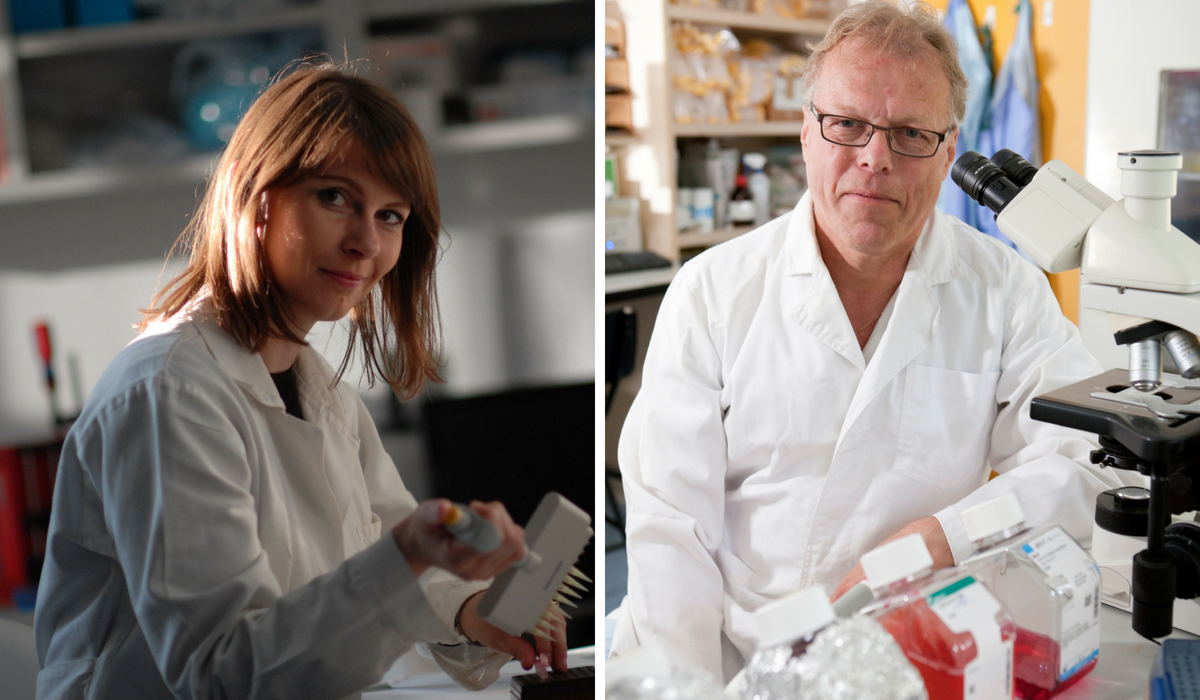In the Czech Republic, triple-negative breast cancer is diagnosed in up to 20 percent of all breast cancer patients. A new compound with anti-cancer activity called MitoTam has been successfully tested in laboratories in the Czech Republic and in Australia and has undergone independent pre-clinical trials in a specialized lab. But now it has started to be tested on patients.
Destroy mitochondria. Kill cancer cells
Eliminating cancer cells by destroying their mitochondria is a strategy that has so far rarely been tested. It has, however, been the focus of an international team led by professor Jiří Neužil, who works at the Institute of Biotechnology of the Czech Academy of Sciences and at Griffith University in Australia. Since 2006 he has been studying compounds that could affect mitochondria. And now they have come across a highly promising agent, MitoTam, that effectively disrupts the function of mitochondria in cancer cells.
Kateřina Rohlenová from the BIOCEV research center in Vestec near Prague (now working as a post-doctoral fellow in the Belgian city of Leuven), who has played an important role in the progress of the project, states:
“Mitochondria are essential for the existence of a cell. They act as the ‘powerhouse of a cell.’ The advantage of our strategy is that mitochondria, the target of the treatment, cannot adapt to the therapy, while they can bypass a variety of established approaches, including chemotherapy or immunotherapy. Therefore the potential of our substance is much broader.”
MitoTam has been under development for four years. The first synthesis was rather complicated and took place in Professor Neužil’s laboratory in Australia. The first experiments on tissue cultures and mice provided very promising results. “After that we transferred research to the Institute of Biotechnology as well, and continued the work in both laboratories. For the next four years we’ve been studying the mechanism of action of our substance and why it exclusively eliminates cancer cells,” Rohlenová adds.
What are mitochondria?
Mitochondria are often regarded as “powerhouses of the cell”. They are a vital organelle as they keep the cell alive and to allow it to divide. This is especially true for cancer cells, because they need much more energy for their constant growth.
Other types of cancer
MitoTam is an abbreviation for mitochondria-targeted analogue of tamoxifen, which is a cure commonly used against breast cancer tumors, but it affects only certain types of breast cancer, as some types of this pathology are resistant to it.
“We’ve shown that MitoTam is much more effective, as it suppresses tumors and kills cancer cells at a lower dose, while acting against a broader spectrum of cancer types. Our results suggest that it’s an exceptionally efficient agent that can potentially be used against other types of cancer,” says Rohlenová.
The research phase finished a year ago. Official pre-clinical tests, which are necessary prior to any clinical testing, were carried out on healthy rats and dogs to evaluate any side effects in mammals. MitoTam successfully passed these tests, so that scientists could move on. Further tests had to be executed by a specialized and certified laboratory and validated by the Czech State Institute for Drug Control (the equivalent of the FDA in the USA). In June the agency granted permission to launch clinical testing of MitoTam.
Collaboration between BIOCEV and Smart Brain
In order for basic research to be translated into a clinical setting, it is necessary to find an investor. The team from the Institute of Biotechnology, part of the BIOCEV Centre, has succeeded in this: they received support from the Czech investor Karel Komárek and his Smart Brain company.
The involvement of Karel Komárek was crucial to allowing MitoTam to progress towards its clinical application. “Without the financial support and incredible amount of energy and persistence in coordination of the project, it wouldn’t be possible to get it through the procedure of patenting and to reach clinical testing,” the director of the Institute of Biotechnology Jana Pěknicová states.
Karel Komárek comments on his involvement in this research: “Every year tens of thousands of patients are diagnosed with cancer in the Czech Republic alone. We are proud that we can take part in developing something that could be beneficial and unique”. His Smart Brain company has been supporting interesting science projects in the Czech Republic for 8 years.
MitoTam is tested in patients
In the first phase of clinical testing oncologists have to verify that MitoTam is not toxic to the human body. The length of a phase cannot be easily predicted – patients will be included one by one and everything depends on their responses to the treatment, how fit the patients are during the treatment, and whether there will be any severe side effects. If the first phase is successful, then phase II will include dozens of patients. According to the regulations, there have to be two more phases with an increased number of patients in multiple institutions in several countries. “The first patient diagnosed with a neuroendocrine lung tumor received MitoTam on the 12th of June. So far we’ve received no reports of toxicity,” Jiří Neužil informs.
MORE ABOUT CANCER AND INNOVATIONS FROM CENTRAL EUROPE
MultiplexDX: Diagnostic tests that lead to personalized treatment











